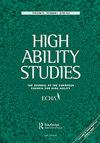学校和课外人才培养的理论方法、社会问题和实践意义:首届欧洲-北美人才发展峰会的成果(第二部分)
IF 1.3
4区 教育学
Q2 EDUCATION, SPECIAL
引用次数: 2
摘要
《天才儿童季刊》和《高能力研究》在首届欧洲-北美人才发展峰会上合作出版了这两期特刊。2016年4月在华盛顿特区举行的峰会有两个主要目标。此次峰会的目的首先是通过召集在欧洲和美国工作的学者,提高研究人员对不同国家正在进行的人才开发工作的认识。峰会的第二个目标是为小型合作会议开创一种新的形式,参与者在会议上向所有其他参与者展示他们正在研究的想法——可以说是媒体——以便在他们完成研究之前获得反馈。此次活动得到了美国心理协会、爱荷华大学贝林·布兰克中心、西北大学人才发展中心和加州大学伯克利分校学术人才发展计划的慷慨资助。为期两天的活动包括关于八个主题的专题介绍。在每个集群中,三名研究人员(两名来自美国机构,一名来自欧洲机构)介绍了他们的工作,并讨论了未来的方向和可能的实施方式。感谢编辑Betsy McCoach、Del Siegle和Albert Ziegler,所有参与者都被邀请根据他们的演讲提交手稿出版。由此产生的关于前四个人才发展集群(理论视角、社会参与、学校背景和校外)工作的文章构成了《天才儿童季刊》的特刊。最后四个人才发展集群(结果、心理社会因素、适应性和不适应性学习、高成就和表现)中的演讲稿构成了《高能力研究》的特刊。本文章由计算机程序翻译,如有差异,请以英文原文为准。
Theoretical approaches, societal issues, and practical implications for school-based and extracurricular talent development: Outcomes of the Inaugural European–North American Summit on Talent Development (Part II)
Gifted Child Quarterly and High Ability Studies collaborated on this pair of special issues resulting from the Inaugural European–North American Summit on Talent Development. The summit, held in Washington, DC, in April 2016, had two main goals. The summit aimed, first, to increase researchers’ awareness of work on talent development being carried out in different countries by bringing together scholars working in Europe and the United States. The summit’s second aim was to initiate a new format for small, collaborative conferences at which participants present ideas they are working on – in medias res, so to speak – to all the other participants in order to receive feedback before they have completed their research. The event was made possible through the generous financial support of the American Psychological Association, the Belin-Blank Center at the University of Iowa, the Center for Talent Development of Northwestern University, and the Academic Talent-Development Program at the University of California, Berkeley. The two-day event consisted of clusters of presentations on eight topics. In each cluster, three researchers (two from American institutions and one from a European institution) presented their work and discussed future directions and possible implementations. Thanks to editors Betsy McCoach, Del Siegle, and Albert Ziegler, all participants were invited to submit manuscripts for publication based on their presentation. The resulting articles on work presented in the first four talent-development clusters (theoretical perspectives, societal participation, the context of school, and outside of school) make up the special issue of Gifted Child Quarterly. Manuscripts arising from presentations in the final four talent-development clusters (outcomes, psychosocial factors, adaptive and maladaptive learning, high achievement and performance) comprise the special issue of High Ability Studies.
求助全文
通过发布文献求助,成功后即可免费获取论文全文。
去求助
来源期刊

High Ability Studies
Multiple-
CiteScore
4.80
自引率
11.10%
发文量
7
期刊介绍:
High Ability Studies provides a forum for scholars in a variety of disciplines associated with the development of human abilities to their highest level. It is a medium for the promotion of high ability, whether through the communication of scientific research, theory, or the exchange of practical experience and ideas. The contents of this journal are unique in reflecting concerns and recent developments in this area from childhood and across the whole life span in a variety of contexts. Far from being restricted to the traditional focus on high-level cognitive development, it also presents investigations into all other areas of human endeavour, including sport, technology, the arts, business, management and social relations.
 求助内容:
求助内容: 应助结果提醒方式:
应助结果提醒方式:


